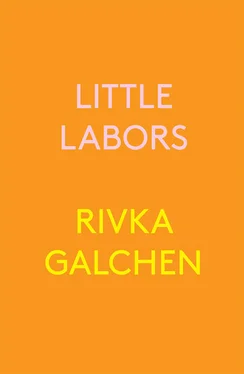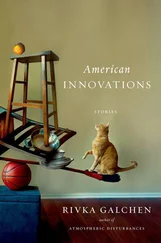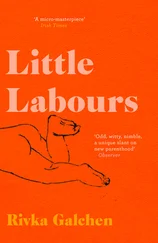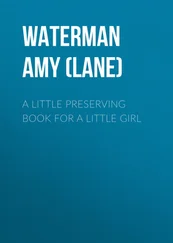Rivka Galchen - Little Labors
Здесь есть возможность читать онлайн «Rivka Galchen - Little Labors» весь текст электронной книги совершенно бесплатно (целиком полную версию без сокращений). В некоторых случаях можно слушать аудио, скачать через торрент в формате fb2 и присутствует краткое содержание. Год выпуска: 2016, Издательство: New Directions, Жанр: Публицистика, Критика, на английском языке. Описание произведения, (предисловие) а так же отзывы посетителей доступны на портале библиотеки ЛибКат.
- Название:Little Labors
- Автор:
- Издательство:New Directions
- Жанр:
- Год:2016
- ISBN:нет данных
- Рейтинг книги:5 / 5. Голосов: 1
-
Избранное:Добавить в избранное
- Отзывы:
-
Ваша оценка:
- 100
- 1
- 2
- 3
- 4
- 5
Little Labors: краткое содержание, описание и аннотация
Предлагаем к чтению аннотацию, описание, краткое содержание или предисловие (зависит от того, что написал сам автор книги «Little Labors»). Если вы не нашли необходимую информацию о книге — напишите в комментариях, мы постараемся отыскать её.
—a key inspiration for Rivka Galchen’s new book — contains a list of “Things That Make One Nervous.” And wouldn’t the blessed event top almost anyone’s list?
Little Labors
Genji
The Pillow Book
Little Labors — atomized and exploratory, conceptually byzantine and freshly forthright — delights.
Little Labors — читать онлайн бесплатно полную книгу (весь текст) целиком
Ниже представлен текст книги, разбитый по страницам. Система сохранения места последней прочитанной страницы, позволяет с удобством читать онлайн бесплатно книгу «Little Labors», без необходимости каждый раз заново искать на чём Вы остановились. Поставьте закладку, и сможете в любой момент перейти на страницу, на которой закончили чтение.
Интервал:
Закладка:
Princess Kaguya
The baby seems younger today, her hand reaching out, grasping and ungrasping like a sea anemone. I pick up something I have read before, something especially short; I have the baby bound and burritoed in a thin blanket next to me, I position her on her side, so she can stare at the black-and-white notecards slotted between the sofa cushions, and she seems content, and I read the story again; the story, The Tale of the Bamboo Cutter , is based on a Japanese myth at least 1,200 years old.
The tale tells of an elderly bamboo cutter who one day comes across a glowing stalk of bamboo. Inside the stalk, he finds a tiny, tiny baby girl. He brings the girl home and he and his wife raise her as their own. The previously poor and childless couple now find gold each time they go out to cut more bamboo. The girl grows quickly into the most beautiful girl in the land, drawing the notice even of the Emperor. But the girl is moody. She has no interest in suitors. She spends a lot of time looking at the night sky. One day, a spaceship arrives; it turns out the girl is from another planet! The gold in the bamboo was a gift in thanks to her adoptive parents for keeping her safe; there had been war on her planet, but now it was time for her to return to where she truly belonged. The girl boards the spaceship and leaves, forever.
Suddenly the strange old myth seems to be just a straightforward and basically realistic tale about babies: their arrival feels supernatural, they seem to come from another world, life near them takes on a certain unaccountable richness, and they are certain, eventually, to leave you. A more “realistic” description of a baby — e.g., “born after a seventeen-hour labor… at 7 pounds 11 ounces… nursing every two hours… smiling at eight weeks, grasping at twelve weeks…”—misses most everything. Only the supernatural gets at the actual. Or so it can seem to a mother on a good day, at least to the mother of a relatively easy baby, who is lying on her side, looking at a picture of an owl.
Rumpelstiltskin
Rumpelstiltskin is a small man with the exuberance and temper of a two-year-old child. He helps the miller’s daughter spin straw into gold. He helps her in this way not once, not twice, but three times! His help saves both the miller’s daughter and the miller. In some versions of the story, this even leads to the miller’s daughter’s marriage to the king. But Rumpelstiltskin doesn’t do this for nothing; the third time he spins straw into gold, he does so in exchange for the miller’s daughter’s future as yet unconceived firstborn.
Still, Rumpelstiltskin isn’t too bad a guy. When the miller’s daughter doesn’t want to hand over her firstborn, Rumpelstiltskin offers her an out. He doesn’t have to offer her an out, but he does. That’s why he’s kind of sweet. The famous out that he offers her — if she can guess his name within three tries then she doesn’t have to give over her baby — wasn’t part of their original deal. Why does he offer her an out at all?
Maybe naming a newborn baby isn’t all that different from guessing the name of Rumpelstiltskin: any name is possible, but only one name proves to be right. It almost seems as if what Rumpelstiltskin is trying to do is to get the miller’s daughter to remember that she is his mother. Rumpelstiltskin’s name, in all the versions, in all the languages, translates into something like, “dear little goblin who makes noise with a stilt.” He is the firstborn, he is the original source of gold; he’s ambivalent about having a sibling.
How the puma affects others, one
A friend has two children with a woman to whom he is no longer married and he is now with a woman who has no children, and who probably wants to have children, though none of this has been openly discussed with me, I am surmising. The two children of the friend are now teenagers, and they themselves have a half sibling already, from their mother’s side, their mother who is known to be appealing but unreliable, able to land, say, in Chicago, before beginning to make phone calls to arrange for babysitting for her children in New York. My friend pays the half sibling’s college expenses. One gets the sense that he fears raising children again with someone who may reveal themselves to be not necessarily internally outfitted in a way suitable for the care of children, but again all of this is surmising, and my friend never mentions thoughts about maybe, or maybe not, having another baby, and knowing him as I do, it is reasonable to guess that he has also maybe not mentioned these thoughts to himself.
One evening, this friend arrives at our home, to meet the puma, when she is fresh, less than two weeks old. He arrives wearing a forty-pound vest. The vest, he says, is recommended as a way to build strength and endurance. It’s just a thing he’s trying out. He just now walked the ten blocks from his home to our home, not too far. But with the vest. His teenage children and his girlfriend are with him too. They are often with him. He is very close to all of them. They say nothing about the vest. He apologizes for being a little late. He had been in a class for potential foster parents, he explains. We have never heard anything about this fostering interest before; it is new. “You always dream of just the normal kid, with no issues, who’s been orphaned by a car crash,” he said explaining his hesitation, but interest, in taking on foster children. “But apparently it’s much more difficult than that.”
How the puma affects others, two
We live at the intersection of Penn Station, the Port Authority, and the Lincoln Tunnel. Very few babies make their home in this area, while a relatively high number of men without homes make their homes here. Between the front door of our building and the butcher shop at the corner there lives a very slim Hispanic man who sometimes sweeps the sidewalk, and who sometimes helps the catering company next door move their boxes, and who sometimes just stands around. Once I saw him directing buses out of the nearby bus parking lot. He is sometimes well, and smoking a cigarette and making conversation with the catering and food cart and garment guys on the block, and he is at other times not well, and half-asleep on the sidewalk. When I first moved to the neighborhood, one afternoon when I walked by him, and he was sitting on the sidewalk, leaning against the wall of the butcher shop, he spat on me and shouted, “Ugly!” After he spat on me a second time, I took to crossing the street to avoid him, especially when I was pregnant, and generally more cautious than usual.
But in those first couple months at home with the puma, the environment around me blurred, like in those photos taken with the f-stop set just so, and one day I didn’t notice this man who lives on our block, and so I didn’t cross the street to avoid him, I instead walked right by him, and I heard someone shouting at me — it was him shouting at me—“God bless you! What a beautiful baby boy. Take care of that boy.” This has consistently been his response to our passing ever since. Even though the puma now occasionally wears a dress. Now, when we walk by, he and the little girl invariably exchange a high five. But not really invariably. When he is smoking, he suggests that she not come too near.
Notes on some twentieth-century writers
Flannery O’Connor: No children.
Eudora Welty: No children. One children’s book.
Hilary Mantel, Janet Frame, Willa Cather, Jane Bowles, Patricia Highsmith, Elizabeth Bishop, Hannah Arendt, Iris Murdoch, Djuna Barnes, Gertrude Stein, Virginia Woolf, Katherine Mansfield, Mavis Gallant, Simone de Beauvoir, Barbara Pym: No children.
Читать дальшеИнтервал:
Закладка:
Похожие книги на «Little Labors»
Представляем Вашему вниманию похожие книги на «Little Labors» списком для выбора. Мы отобрали схожую по названию и смыслу литературу в надежде предоставить читателям больше вариантов отыскать новые, интересные, ещё непрочитанные произведения.
Обсуждение, отзывы о книге «Little Labors» и просто собственные мнения читателей. Оставьте ваши комментарии, напишите, что Вы думаете о произведении, его смысле или главных героях. Укажите что конкретно понравилось, а что нет, и почему Вы так считаете.












